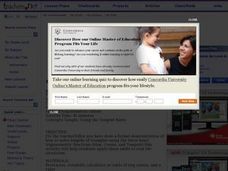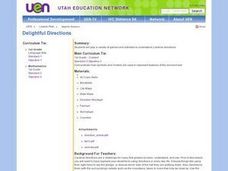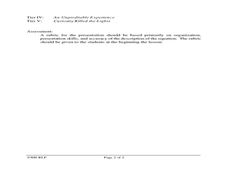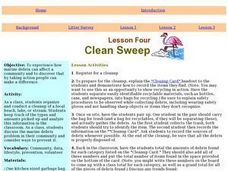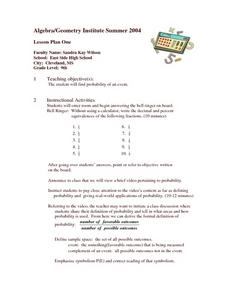Curated OER
Classification: Dichotomous Key
Young scholars investigate the classification process and nomenclatures used for classifying organisms. They study dichotomous keys to identify organisms with 90% accuracy. Students organize information regarding the relatedness of species.
Curated OER
Children's Literature Across the Curriculum Ideas-Dancing With the Indians
Pupils read Dancing With the Indians by Angela Shelf Medearis. They complete a variety of cross-curricular activities surrounding the study of Native American festivals and traditions. Included are reading, art, math, science, writing,...
Curated OER
A VIP - Present Perfect Simple and Continuous
Here is an interesting way to teach the present perfect and present perfect continuous. Individuals practice these verb tenses as well as the simple past by asking a partner questions about an imaginary biography. The biography is...
Curated OER
Revolutionary Money
Examine paper money from the American revolution! Historians study the paper bills and discuss the history of money. How has money changed over the times? Activities are included.
Curated OER
ExplorA-Pond:3rd Grade Shapes & Fractions
Learners, using a map, drawing or aerial view of a pond, represent the shape of the pond using simple geometric shapes or fractions of those shapes. They identify the numerator and denominator in each fraction created.
Curated OER
Children's Literature Across the Curriculum Ideas-The Christmas Miracle of Jonathan Toomey
Pupils read The Christmas Miracle of Jonathan Toomey by Susan Wojacieckowski. They complete a variety of cross-curricular activities surrounding the Christmas holiday. Included are reading, art, math, science, writing, social studies,...
Teach Engineering
The Advantage of Machines
Show your students how to make their work easier. The first lesson in a series of 10 introduces the class to work and the way simple machines can be make work easier. The simple machines scholars can find in everyday items are inclined...
Curated OER
Breathe In, Breathe Out
Students study the respiratory system, the lungs and air. In this respiratory instructional activity students describe technologies that engineers have found that improve the health of the respiratory system.
Curated OER
Digestion Simulation
Students study the human digestion system and the functions of the stomach and small intestines. In this digestion instructional activity students view a demonstration on the process.
Curated OER
Families and Communities
Here is a week-long lesson on the roles of family members designed for first graders. In it, learners share stories of their families, listen to books about families read to them by their teacher, complete homework assignments and...
Curated OER
Part Part Whole
First graders solve number sentences. In this problem solving lesson, 1st graders construct addition sentences using a part part whole mat. Students demonstrate problem solving strategies using cubes.
Curated OER
Walking on Air
Pupils collect and analyze data with a graph. In this statistics instructional activity, students use central tendencies to find the meaning of their data. They display the data on a Ti calculator.
Curated OER
What Language Do You Speak?
Fourth graders engage in a lesson based on a game and is to be played in groups. A card be drawn from a deck. On this card is a verbal description of a mathematical statement. They use worksheets imbedded in this lesson which give...
Curated OER
Intro to Trigonometry
After being introduced to the basic trigonometry functions, learners calculate the height of school landmarks. They experiment with different angles to find the correct height.
Curated OER
Math, Chemistry, and Food
Young scholars explore the effects of chemical reactions when cooking. Using the Internet, they research enzymes and then mix jello. They examine their results and test enzyme activity by adding pineapple to the jello. Finally, they...
Curated OER
Using Math to Draw the Mayflower
Third graders access information from a website about the Pilgrims trip on the Mayflower and discuss the number of people on the ship and the time they spent on the ship. They draw, label and measure the Mayflower to perspective.
Curated OER
Delightful Directions
First graders identify and demonstrate how symbols and models are used to represent features of the environment. They identify the directions on a map as east, west, north, and south. Finally, 1st graders play a direction game, move to...
Curated OER
Mathematics-Algebra II
Tenth graders investigate relations and functions. For this algebra lesson, 10th graders perform or research real life situation involving functions. This assignment can be used as a year end project.
Curated OER
Clean Sweep
Students organize and conduct a cleanup of a local beach, lake, or stream. They keep track of the types and amounts picked up and analyze this information in the classroom.
Curated OER
The Football Kick:An Application of Parametric Equations
Learners investigate the concepts relating to the solving of parametric equations. They take the derivatives of parametric equations during guided and independent practice using the problems provided in the lesson plan. Students also...
Curated OER
Finding the Probability
Ninth graders investigate the concept of probability. They use a clear objective that is a visual cue for what is required for the lesson. They apply the basic practices of probability to real life like situations.
Curated OER
Landforms
Learners study how landforms affect all aspects of a community. Students work in groups to identify landforms from other works of art. In cooperative groups Learners select a work of art depicting a particular land form and create a poem.
Curated OER
Scaling Down Art
Students change the scale of a work of art using ratios, percentages, and proportions. While this is technically an art lesson, there is quite a bit of mathematics involved in converting to the correct scale.
Curated OER
Count The Letters
Students perform activities involving ratios, proportions and percents. Given a newspaper article, groups of students count the number of letters in a given area. They use calculators and data collected to construct a pie chart and bar...















